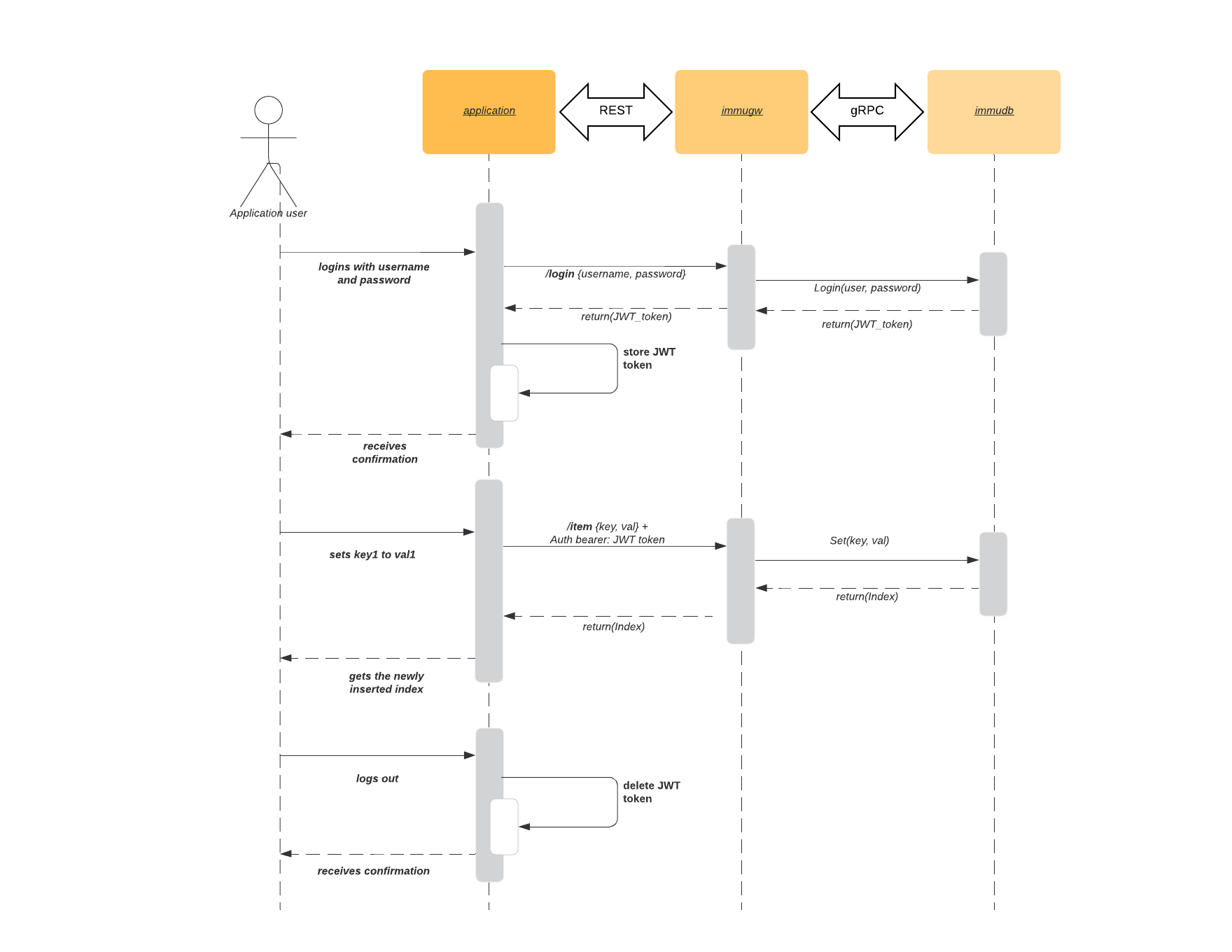immugw is the intelligent REST proxy that connects to immudb and provides a RESTful interface for applications. We recommend to run immudb and immugw on separate machines to enhance security
To build the binaries yourself, simply clone this repo and run
make all
# run immugw in the foreground
./immugwService installation and management are supported on Linux, Windows, OSX and FreeBSD operating systems.
# install immugw service
./immuadmin service immugw install
# check current immugw service status
./immuadmin service immugw status
# stop immugw service
./immuadmin service immugw stop
# start immugw service
./immuadmin service immugw start
The linux service is using the following defaults:
| File or configuration | location |
|---|---|
| executable | /usr/sbin/immugw |
| all configuration files | /etc/immugw |
| pid file | /var/lib/immugw/immugw.pid |
| log files | /var/log/immugw |
The FreeBSD service is using the following defaults:
| File or configuration | location |
|---|---|
| executable | /usr/sbin/immugw |
| all configuration files | /etc/immugw |
| pid file | /var/run/immugw.pid |
| log files | /var/log/immugw |
The Windows service is using the following defaults:
| File or configuration | location |
|---|---|
| executable | Program Files\Immugw\immugw.exe |
| configuration file | ProgramData\Immugw\config\immugw.toml |
| all data files | ProgramData\Immugw\ |
| pid file | ProgramData\Immugw\config\immugw.pid |
| log file | ProgramData\Immugw\config\immugw.log |
Simply run ./immugw -d to start immugw on the same machine as immudb (test or dev environment) or pointing to the remote immudb system ./immugw --immudb-address "immudb-server".
If you want to stop immugw în that case you need to find the process ps -ax | grep immugw and then kill -15 <pid>. Windows PowerShell would be Get-Process immugw* | Stop-Process.
immu gateway: a smart REST proxy for immudb - the lightweight, high-speed immutable database for systems and applications.
It exposes all gRPC methods with a REST interface while wrapping all SAFE endpoints with a verification service.
Environment variables:
IMMUGW_ADDRESS=0.0.0.0
IMMUGW_PORT=3323
IMMUGW_IMMUDB_ADDRESS=127.0.0.1
IMMUGW_IMMUDB_PORT=3322
IMMUGW_DIR=.
IMMUGW_PIDFILE=
IMMUGW_LOGFILE=
IMMUGW_DETACHED=false
IMMUGW_MTLS=false
IMMUGW_SERVERNAME=localhost
IMMUGW_AUDIT=false
IMMUGW_AUDIT_INTERVAL=5m
IMMUGW_AUDIT_USERNAME=immugwauditor
IMMUGW_AUDIT_PASSWORD=
IMMUGW_AUDIT_SIGNATURE=ignore
IMMUGW_PKEY=
IMMUGW_CERTIFICATE=
IMMUGW_CLIENTCAS=
Usage:
immugw [flags]
immugw [command]
Available Commands:
help Help about any command
version Show the immugw version
Flags:
-a, --address string immugw host address (default "0.0.0.0")
--audit enable audit mode (continuously fetches latest root from server, checks consistency against a local root and saves the latest root locally)
--audit-interval duration interval at which audit should run (default 5m0s)
--audit-password string immudb password used to login during audit; can be plain-text or base64 encoded (must be prefixed with 'enc:' if it is encoded)
--audit-username string immudb username used to login during audit (default "immugwauditor")
--certificate string server certificate file path (default "./tools/mtls/4_client/certs/localhost.cert.pem")
--clientcas string clients certificates list. Aka certificate authority (default "./tools/mtls/2_intermediate/certs/ca-chain.cert.pem")
--config string config file (default path are configs or $HOME. Default filename is immugw.toml)
-d, --detached run immudb in background
--dir string program files folder (default ".")
-h, --help help for immugw
-k, --immudb-address string immudb host address (default "127.0.0.1")
-j, --immudb-port int immudb port number (default 3322)
--logfile string log path with filename. E.g. /tmp/immugw/immugw.log
-m, --mtls enable mutual tls
--pidfile string pid path with filename. E.g. /var/run/immugw.pid
--pkey string server private key path (default "./tools/mtls/4_client/private/localhost.key.pem")
-p, --port int immugw port number (default 3323)
--servername string used to verify the hostname on the returned certificates (default "localhost")
Use "immugw [command] --help" for more information about a command.
immugw is also available as docker images on dockerhub.com.
| Component | Container image |
|---|---|
| immugw | https://hub.docker.com/r/codenotary/immugw |
docker run -it -d -p 3323:3323 --name immugw --env IMMUGW_IMMUDB_ADDRESS=immudb codenotary/immugw:latest
If you want to build the container images yourself, simply clone this repo and run
docker build -t myown/immugw:latest -f Dockerfile .
immugw provides a simple solution to interact with immudb with REST protocol, without taking in charge the merkle tree root hash file management and concurrency related complexity.
immugw proxies REST client communication and gRPC server interface. For security purposes immugw should not run on the same server as immudb. The following diagram shows how the communication works:
You can find the swagger schema here:(https://github.com/codenotary/immugw/blob/master/swagger.json). If you want to run the Swagger UI, simply run the following Docker command after you cloned the immugw repo, or the json file:
docker run -it -p 8081:8080 --name swagger-immugw -v ${PWD}/swagger.json:/openapi.json -e SWAGGER_JSON=/openapi.json swaggerapi/swagger-ui
curl --location --request POST '127.0.0.1:3323/login' \
--header 'Authorization;' \
--header 'Content-Type: application/json' \
--data-raw '{
"user": "aW1tdWRi",
"password": "aW1tdWRi"
}'curl --location --request GET '127.0.0.1:3323/db/use/defaultdb' \
--header 'Content-Type: application/json' \
--header 'Authorization: {{token}}'curl --location --request POST '127.0.0.1:3323/login' \
--header 'Authorization;' \
--header 'Content-Type: application/json' \
--data-raw '{
"user": "aW1tdWRi",
"password": "aW1tdWRi"
}'curl --location --request POST '127.0.0.1:3323/db/{database_name}/verified/set' \
--header 'Content-Type: application/json' \
--header 'Authorization: {{token}}' \
--data-raw '{
"setRequest": {
"KVs": [
{
"key": "a2V5MQ==",
"value": "dmFsMQ=="
}
]
}
}'curl --location --request POST '127.0.0.1:3323/db/{database_name}/verified/get' \
--header 'Content-Type: application/json' \
--header 'Authorization: {{token}}' \
--data-raw '{
"keyRequest": {
"key": "a2V5MQ=="
}
}'curl --location --request POST '127.0.0.1:3323/db/{database_name}/verified/setreference' \
--header 'Content-Type: application/json' \
--header 'Authorization: {{token}}' \
--data-raw '{
"referenceRequest": {
"key": "dGFnMQ==",
"referencedKey": "a2V5MQ==",
"atTx": "0"
}
}'curl --location --request POST '127.0.0.1:3323/db/{database_name}/verified/zadd' \
--header 'Content-Type: application/json' \
--header 'Authorization: {{token}}' \
--data-raw '{
"zAddRequest": {
"set": "c2V0MQ==",
"score": 15.5,
"key": "a2V5MQ==",
"atTx": "0"
}
}'curl --location --request POST '127.0.0.1:3323/db/{database_name}/zscan' \
--header 'Content-Type: application/json' \
--header 'Authorization: {{token}}' \
--data-raw '{
"set": "c2V0MQ=="
}'curl --location --request POST '127.0.0.1:3323/db/{database_name}/history' \
--header 'Authorization: {{token}}' \
--header 'Content-Type: application/json' \
--data-raw '{
"key": "a2V5NQ=="
}'curl --location --request GET '127.0.0.1:3323/db/{database_name}/verified/tx/1' \
--header 'Content-Type: application/json' \
--header 'Authorization: {{token}}'curl --location --request POST '127.0.0.1:3323/db/{database_name}/sqlexec' \
--header 'Authorization: {{token}}' \
--header 'Content-Type: application/json' \
--data-raw '{
"sql":"CREATE TABLE mytable23 (id INTEGER, amount INTEGER, total INTEGER, title VARCHAR, content BLOB, isPresent BOOLEAN, PRIMARY KEY id)"
}'curl --location --request POST '127.0.0.1:3323/db/{database_name}/sqlexec' \
--header 'Authorization: v2.public.eyJkYXRhYmFzZSI6IjUiLCJleHAiOiIyMDIxLTEwLTI4VDE4OjU1OjAyKzAyOjAwIiwic3ViIjoiaW1tdWRiIn3-aNUXqydajYFR9Aa7-q40JepLuA0tsPXeR1nRo75jA1H45RZZU9Twt6EVi-4bS4gpzeQcRNEdJs8U5oM5urcM.aW1tdWRi' \
--header 'Content-Type: application/json' \
--data-raw '{
"sql":"INSERT INTO myTable23 (id, amount, title, content, isPresent) VALUES (2, 1000, '\''title 1'\'', x'\''626C6F6220636F6E74656E74'\'', true)"
}'byte arrays need to be hex encoded
curl --location --request POST '127.0.0.1:3323/db/{database_name}/sqlquery' \
--header 'Authorization: {{token}}' \
--header 'Content-Type: application/json' \
--data-raw '{
"sql":"SELECT * from mytable23;"
}'Its possible also to tamperproof verify a SQL row.
curl --location --request POST '127.0.0.1:3323/db/{database_name}/verified/row' \
--header 'Authorization: v2.public.eyJkYXRhYmFzZSI6IjUiLCJleHAiOiIyMDIxLTEwLTI4VDE4OjU1OjAyKzAyOjAwIiwic3ViIjoiaW1tdWRiIn3-aNUXqydajYFR9Aa7-q40JepLuA0tsPXeR1nRo75jA1H45RZZU9Twt6EVi-4bS4gpzeQcRNEdJs8U5oM5urcM.aW1tdWRi' \
--header 'Content-Type: application/json' \
--data-raw '{
"row": {
"columns": [
"(testdb1.mytable23.id)",
"(testdb1.mytable23.amount)",
"(testdb1.mytable23.total)",
"(testdb1.mytable23.title)",
"(testdb1.mytable23.content)",
"(testdb1.mytable23.ispresent)"
]
},
"values": [
{
"n": "2"
},
{
"n": "1000"
},
{
"null": null
},
{
"s": "title 1"
},
{
"bs": "YmxvYiBjb250ZW50"
},
{
"b": true
}
],
"table": "mytable23",
"pkValues": [
{
"n": "2"
}
]
}'byte arrays need to be b64 encoded
curl --location --request POST '127.0.0.1:3323/logout' \
--header 'Authorization: {{token}}' \
--header 'Content-Type: application/json'immugw is Apache v2.0 License.
immudb re-distributes other open-source tools and libraries - Acknowledgements.





